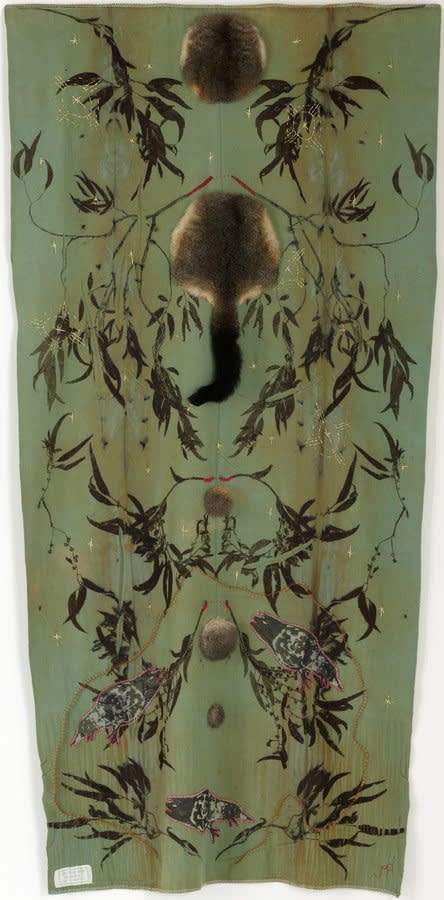Recognised artwork - Mudhay burrugarrbuu- bula / Possum Magpie, Bush Contact Print on Woollen Blanket, Possum Fur Screenprint, Cotton and Synthetic Thread, Original, 220 x 105cm
Juanita McLauchlan Announced as Wynne Prize Finalist 2024
Art Prize
A sincere congratulations to Juanita McLauchlan who has been announced as a Wynne Prize Finalist 2024.
Juanita McLauchlan will be exhibiting at OTOMYS from 13th-28th June 2024 alongside Julia Roche in their exhibition titled ‘Held in Place’.
Juanita McLauchlan was born on her Grandmother’s Country, Gamilaraay Country, in Moree and has lived in many places across Australia before spending the last 20-years with her family in Wagga Wagga. Trained as a printmaker, Juanita has recently begun working with methods of contact-printing: using Indigenous plants sourced locally on Wiradjuri Country to eco-print on textiles. This method has allowed Juanita to work at a greater scale, printing directly onto recycled woollen blankets—a staple belonging of Aboriginal families since colonisation. The printed blankets are hand-stitched or cut into strips and made into necklaces adorned with possum-fur and bound with red thread symbolic of the family bloodline. There is a deep consideration in the choice of materials; Juanita draws on her Gamilaraay and European heritage, family stories, local histories and ways of making. Stories and memories are held in the material itself, and overlayed through printing and stitching, of the interconnectedness of Juanita’s family, with Country, across time.
‘We had a visit from over 20 magpies when our daughter was born,’ says first-time Wynne finalist Juanita McLauchlan. ‘They sang at the back door when we brought her home – a welcome we had never experienced. She is almost four and the magpies run up to us on the street to this day.’
In her 2024 Wynne Prize work, McLauchlan has contact-and screen-printed, stitched, and embellished Wiradjuri country – Wagga Wagga, where she currently resides. While a guest to these lands, her work captures the importance of home, and celebrates the strong Wiradjuri Elders who have held on to culture.
McLauchlan says that this work is also an ode to the guardians who watch over her daughter: the magpie who sings to her in the daytime, and the possum who watches over her at night. The materiality of the work also purposefully complicates the history of Aboriginal and European settler relations across the southeast of Australia. At the time of settlement, Aboriginal families received rationed blankets, which served as an informal census.
Request Juanita McLauchlan’s catalogue of available work via info@otomys.com.
June 6, 2024
